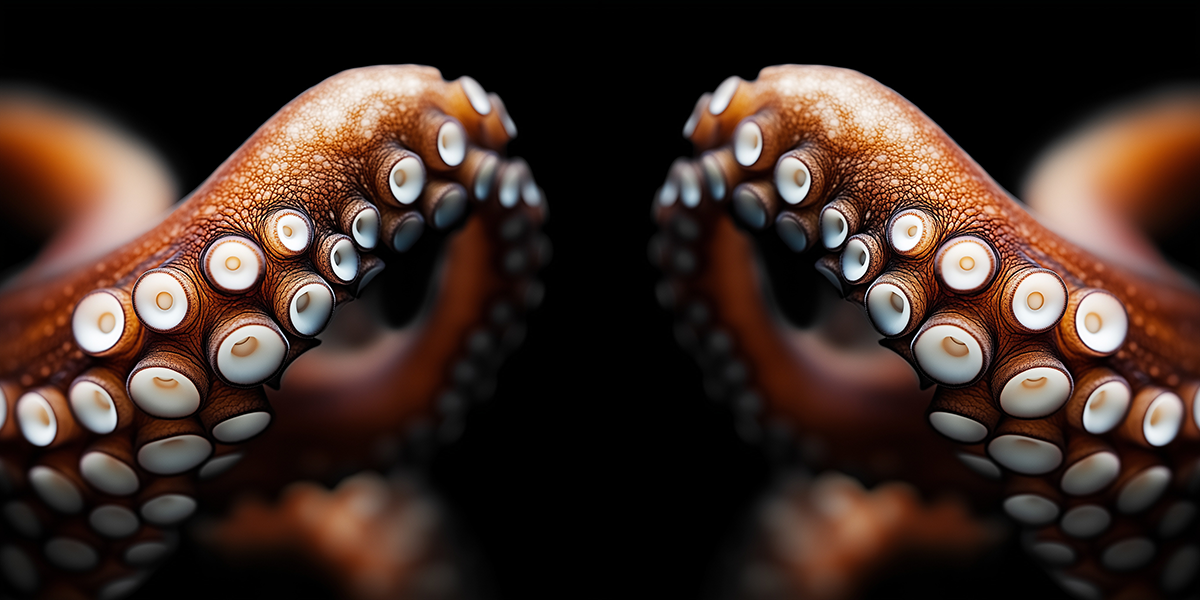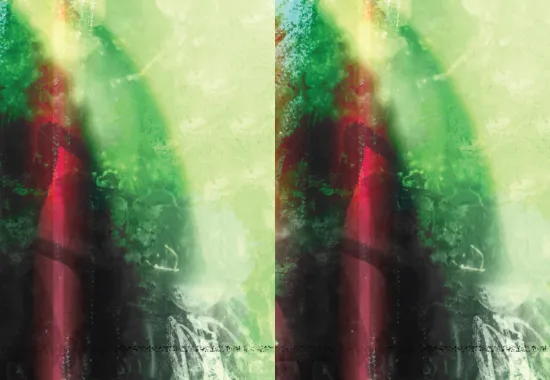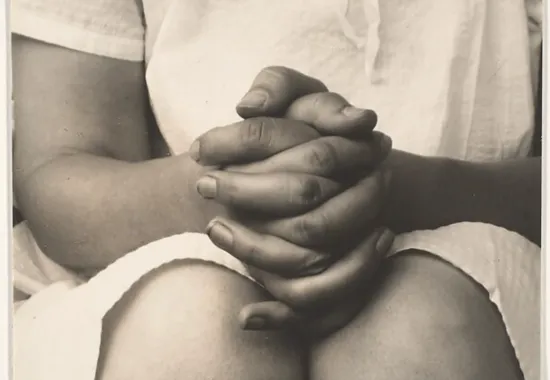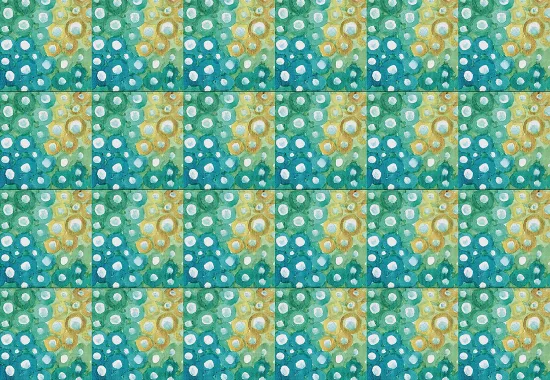“A Threshold to Power”: A Review of Sarah Giragosian’s Mother Octopus
Winner of the 2023 Halcyon Poetry Award, Sarah Giragosian’s third full-length collection, Mother Octopus, embodies the eponymous creature herself: clever, playful, inventive, shifting her color palette to communicate and camouflage. The poems range from tender elegies to Earth and the speaker’s late mother, to philosophical ruminations on death and renewal, to erotic eco-poems of resilience and communion.
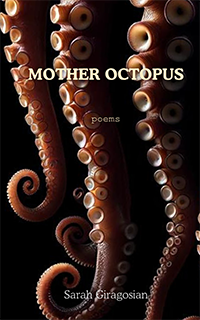
Mother Octopus opens with the speaker’s ode to deep time. Precise and compact as an inkfish squeezed into a crevice, “Saltonstall Residency, Ithaca, NY Haibun” transports the reader through geologic time to the birth of a landscape, wasting no time with the opening line: “Underwater once: all you now ogle.” From the palimpsest of ancient ocean to today’s rocks’ “glacier-grinded faces” and the “apprentice tides hammering land,” the speaker evokes a violent, almost mythological workshop shaping the terrain beneath her feet. Propulsively and organically, like the “birth of rivers bursting forth” the poem then plunges the reader forward to the lives of present-day fauna and lands on a brilliantly unexpected parallel. Glaciers and braying cattle link the motherhoods of minerals and mammals: “A mother’s vast tongue/licks her calf into being,/flush with a new idea.”
The eponymous poem in Mother Octopus is at once heartrending and playful: “Much is made of the final months of a mother octopus. / Dandle the lacy funk of a hundred or so serried eggs / on your arms for fifty-three months while wasting away / and National Geographic is guaranteed to have a field day.” A scholar of Marianne Moore, Giragosian nods to and departs from Moore’s “The Paper Nautilus” (What Are Years?) whose “perishable / souvenir of hope” is embodied by “eggs coming from the shell [which] free it when they are freed.” Giragosian’s poem also pays intimate attention to the rites of aquatic reproduction. But where Moore compares love to a fortress, invoking the image of a stalwart embrace, Giragosian’s poem releases the mourned mother figure, unbound from the binary constraint of fecundity and martyrdom vs. individual freedom. The speaker reminds us of the power of imagining alternative futures (for mothers, too, amazingly), “flourishing, freed, afloat with possibility.”
However, the poem also underscores the pain of survival, alluding to the speaker’s premature loss of her mother. A tampered-with octopus will “abandon her eggs, hunt and feed again. / Survive.” Survive, in the Middle English, meant to outlive, what a parent most dreads in relation to their child. In this poem, however, the orphaned speaker nearly wishes to sacrifice herself (“just another entry in a book of baby names”) to have another chance to spend time with her mother, declaring, heartbreakingly and impossibly: “you never had to lose / yourself for me.”
In a sister poem to Camille Dungy’s “Trophic Cascade,” in which the speaker also catalogs an ecosystem’s species before shifting to her own role therein, Giragosian’s “Whale Fall” presses the structure of the poem to near disintegration so that the reader feels, paradoxically, a sense of settling into divine ecological communion in the final lines: “Mouthfuls of me in everybody, / I could be any body.” Remarkable in form and content, “Whale Fall” imitates a corporeal disintegration as it utilizes negative space on the page, line breaks, and a scattering cascade of immersive oceanic detail with the added pleasure of the poet’s sibilant verbs to simulate slavering jaws: “rattail fish & stone crabs, hagfish / & bristleworms snag a place / at the banquet & tuck into thickets / of flesh, sloughing off bits…” The speaker contemplates her own death, not as loss, but as transformation, becoming “the crux of matter: / a threshold to power for another.”
Mother Octopus is broad reaching in scope, cyclical and regenerative like an ecosystem.
On a similar thematic vein, a darkly humorous poem, “Virgil the Vulture Contemplates Life” plays with rhyme and imagistic ebullience to both repulse and delight the reader in its unrelenting reverence of the subject, Virgil, “an undertaker with a taste for innards, / a gourmand affluent in gizzards.” The speaker’s wry admiration of the beloved scavenger extends to all that capitalism disdains: “the ambrosia-waft / of carcass in early rot” and the bird’s taste for “mandibles of mice, skeins of pelage.” One of the collection’s more subversive poems, Giragosian showcases in “Virgil” many of her strengths as an eco-poet: rapt study of the natural world; a brazen disregard for our toxic economy’s demands, particularly on women’s labor (think of the time it took to “exalt in the ruff of feathers, tar-black”!); and an ability to channel the urgent necessity of otherness. Giragosian reminds us that, despite humankind’s insatiable omnivorism, mother nature has long had better solutions when her speaker addresses Virgil: “it’s a blessing / I suppose to know that you’d never let me go to waste.” Like M.S. Merwin’s “Avoiding News by the River” (The Lice) in which the speaker fantasizes that “If I were not human I would not be ashamed of anything,” Giragosian’s “Virgil” unashamedly eviscerates expectations of beauty, as well as reminding the speaker of her possible iterations—there will come a day for each of us when we are, again, not human.
What one might claim is the Anthropocene’s worst and most dangerous charade—humans’ belief we are separate from, or worse, superior to nature—is confronted in the astonishingly lush final poem, “Love Song of the Fig Wasp” in which the speaker-wasp invites the reader to sensuous, albeit fatal, intimacy inside the fig: “I creep around the fruit’s pips, / bigger than my eyes, make a home / inside pulp bursting with clusters / and clusters of flowers, ecstasies upon ecstasies!” At once self-elegy and love poem, the speaker-wasp gives her body to the reader’s body in sublime arduous labor: the ardor of passion and the dual labor of birthing and dying. The collection, thus, lands on the highest of notes, so intimate as to dissolve with the wasp in this honeyed facet of ecosystem, but with the “future trust” of the next generation: “Yes: I will die locked inside that paradise, / and my sons, once mated, will too. / But my daughters? / They’ll carry on what I started; / dressed in pollen, they’ll escape, find the next fig.”
A mother octopus literally gives her life to support her eggs, and one of this collection’s recurrent—though never repetitive—themes is the haunting beauty of death and disintegration as integral to life. Mother Octopus is broad reaching in scope, cyclical and regenerative like an ecosystem. A master class in integrating an inner self’s emotional content with an eco-poetics of grief and vitality, while rejecting the hegemony of the anthropocentric gaze, the collection weaves metaphor with fact until the boundaries are tightly dovetailed. Whether through the eyes of a singular side-eyed vulture or an unnamed lustful wasp, Giragosian’s keen inquiry into the habits and hungers of our fellow creatures lends originality to each poem while offering a cohesive throughline. That is, that the counterpoints of life vs. death, human vs. nature, human vs. animal, are false binaries. Mother Octopus as a collection is its own symbiotic system which reminds humans that we, too, are—merely and divinely—Earth’s fruit.
Recommended
A Review of When We Were Gun: A Narrative Poetry Cycle by Deborah Schupack
A Review of Apostasies by Holli Carrell


